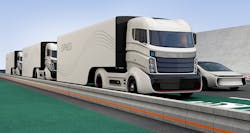Automated Trucks Will Help Truckers Not Push Them Out, New Study Says
Truck drivers can breathe a sigh of relief according to a new report commissioned by the American Center for Mobility, led by Michigan State University and supported by Texas A&M Transportation Institute (TTI).
Only a modest number of truck driver jobs, if any, will be affected by the rise in automated vehicles (AVs) the report said.
While significant numbers of AVs will not be deployed until the latter half of the 2020s, at that point, some displacement of passenger car-based driving jobs could occur, mainly among taxicab drivers, according to researchers. However, due to existing truck driver worker shortages, and the belief that automated technology will largely support truck drivers instead of replacing them, truck drivers are not likely to be displaced in large numbers during the next ten years that the study covered.
“In the near-term there is great potential for these technologies to assist commercial drivers in safely operating trucks," said Christopher Poe, Assistant Director for Connected and Automated Transportation Strategy, TTI. "Longer-term it will be important to define, develop, and deliver targeted training for the workforce.,”
The study’s authors recommend the following steps be taken:
• Conduct additional research that captures the input of the vehicle operators in different workforce sectors on what training they would be interested in pursuing.
• Identify, in greater detail, the specific skillsets needed by the automotive and technology industries to facilitate the creation and adoption of AVs.
• Establish rapid coursework and training that meets those specific needs.
• Conduct additional research to quantify the overall positive financial impact of automated vehicle technology on the economy as a whole, and the potential for job creation.
“This level of advanced technology has the potential to lead to the creation of thousands of new jobs in the engineering, data analysis, cybersecurity and vehicle ‘monitoring’ areas,” said Shelia Cotten, MSU Foundation Professor at Michigan State University, who led the research. Based on data collected from industry experts during the study, there is already a significant demand in several of these areas related to AVs.”
The report suggests a substantial change to the way workers in many industries do their jobs, in some instances radically. The research indicates motor vehicle manufacturers and technology firms working in the automated vehicle arena are already finding it difficult to hire enough workers with certain technology skillsets; and as automated vehicles begin to proliferate, maintenance and certain adjacent occupations will need to evolve and expand.
